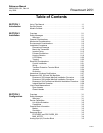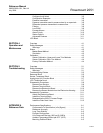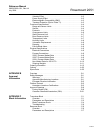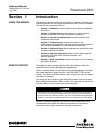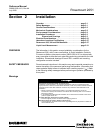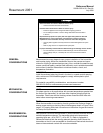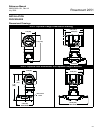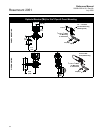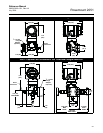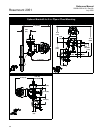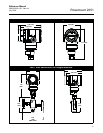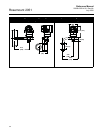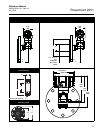
Reference Manual
00809-0200-4101, Rev AA
July 2008
Rosemount 2051
2-2
GENERAL
CONSIDERATIONS
Measurement accuracy depends upon proper installation of the transmitter
and impulse piping. Mount the transmitter close to the process and use a
minimum of piping to achieve best accuracy. Also, consider the need for easy
access, personnel safety, practical field calibration, and a suitable transmitter
environment. Install the transmitter to minimize vibration, shock, and
temperature fluctuation.
IMPORTANT
Install the enclosed pipe plug (found in the box) in unused conduit opening
with a minimum of five threads engaged to comply with explosion-proof
requirements.
For material compatibility considerations, see document number
00816-0100-3045 on www.emersonprocess.com/rosemount.
MECHANICAL
CONSIDERATIONS
NOTE
For steam service or for applications with process temperatures greater than
the limits of the transmitter, do not blow down impulse piping through the
transmitter. Flush lines with the blocking valves closed and refill lines with
water before resuming measurement.
NOTE
When the transmitter is mounted on its side, position the Coplanar flange to
ensure proper venting or draining. Mount the flange as shown in Figure 2-8 on
page 2-16, keeping drain/vent connections on the bottom for gas service and
on the top for liquid service.
ENVIRONMENTAL
CONSIDERATIONS
Best practice is to mount the transmitter in an environment that has minimal
ambient temperature change. The transmitter electronics temperature
operating limits are –40 to 185 °F (–40 to 85 °C). Refer to Appendix A:
Reference Data that lists the sensing element operating limits. Mount the
transmitter so that it is not susceptible to vibration and mechanical shock and
does not have external contact with corrosive materials.
Electrical shock can result in death or serious injury.
• Avoid contact with the leads and terminals.
Process leaks could result in death or serious injury.
• Install and tighten all four flange bolts before applying pressure.
• Do not attempt to loosen or remove flange bolts while the transmitter is
in service.
Replacement equipment or spare parts not approved by Emerson Process
Management for use as spare parts could reduce the pressure retaining
capabilities of the transmitter and may render the instrument dangerous.
• Use only bolts supplied or sold by Emerson Process Management as spare
parts.
• Refer to page A-25 for a complete list of spare parts.
Improper assembly of manifolds to traditional flange can damage sensor module.
• For safe assembly of manifold to traditional flange, bolts must break back
plane of flange web (i.e., bolt hole) but must not contact sensor module
housing.




